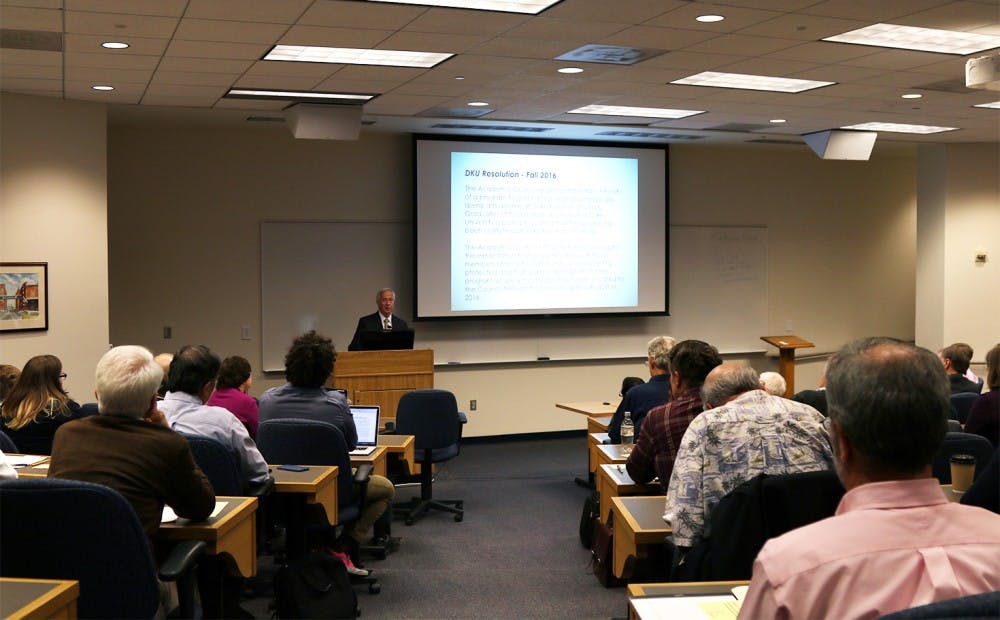Students are one step closer to being able to earn an undergraduate liberal arts degree at Duke Kunshan University.
At its November meeting, Academic Council—the University's faculty governance body—voted to endorse the creation of an four-year undergraduate degree program at DKU by a 57-18 vote, following three years of intense debate. The next step in the approval process is for the resolution to be heard by the Board of Trustees.
"I’m very excited about the vote,” said Provost Sally Kornbluth, one of key proponents of the proposal. “This is a wonderful thing for Duke to be doing, and we have had a great dialogue over a number of years.”
During the meeting, some faculty members raised concerns about the impending retirement of President Richard Brodhead, the status of intellectual freedom in China and the University's economic investment in the venture, but most expressed excitement about the opportunities available with the expansion of Duke’s involvement in China.
The undergraduate degree would be added to the programs Duke already offers in Kunshan, which include master’s degrees in environmental policy, medical physics, global health and management studies.
Brodhead opened the discussion of the resolution by acknowledging that it has inspired “diametrically opposed” viewpoints among the faculty, but that they have debated the benefits and risks of the program with civility. He contrasted this with the “protracted election cycle” that preceded the national election earlier this month, and praised the process that has taken the proposal to where it is today.
“We have prepared and prepared and prepared,” he said. “Committees spent all last year working their way through this. We are in a state of readiness we will never be at again to make this decision.”
Brodhead also rebutted a query as to how inclined his successor would be to continue the work, noting that presidential candidates have been briefed on their responsibility for the project. He jokingly added that none had dropped out yet because of it.
The costs of the venture were one issue of key concern to the faculty. Brodhead explained that Duke’s contribution would be $5 million annually, and the Kunshan government would subsidize up to $45 million.
Thomas Robisheaux, professor of history and chairman of the Arts and Sciences Council when the proposal was first discussed there, talked about the DKU undergraduate degree in a historical context.
He urged the Academic Council to vote for it as “stewards of a liberal arts tradition” with origins in 11th and 12th century Europe, but acknowledged that there would be setbacks. He warned his colleagues to expect conflict but to use this opportunity to “light a flame in China.”
Alexander Rosenberg, R. Taylor Cole professor of philosophy, cited academic freedom issues as one of the motivating factors for why Duke should be involved in Kunshan.
“Not only do we have an opportunity to establish an institution that expresses the values that we are committed to in a country that may, or may not, need the kind of exemplar that we could produce,” he said. “But for ourselves, and for the purpose of faculty governance at this university, to have an institution about which our faculty is concerned and committed will provide a test for faculty governance at Duke.”
In contrast, Charles Becker, research professor of economics, said that he was voting for the proposal with reluctance, noting that the University had not considered the opportunity cost associated with establishing a campus in China when one could potentially be established elsewhere.
Earl Dowell, the William Holland Hall professor of mechanical engineering, took issue with the proposal, saying that one of the defining features of Duke is the liberal arts education within a research institution. He noted that there is something special about this sort of contextualization of the undergraduate education, which would not necessarily be the case at the Kunshan campus.
Brodhead responded to the criticism, encouraging the faculty to think big and to “make no little plans.”
“If I thought this were going to be an island of undergraduate liberal arts in the middle of nothing, then I would say that this is not what Duke is,” Brodhead said. “But we began with graduate programs, as you all remember, and we have begun by creating research centers, and it is absolutely part of the curriculum that undergraduates will participate in and benefit from the research centers.”
William Johnson, a professor of classical studies, taught at DKU for a semester in 2014. He warned his colleagues against viewing the venture as a paternalistic enterprise, but said that he learned a great deal from his time there.
He emphasized the importance of the vote that the council was facing.
“I think when a historian writes the history of Duke University, a hundred years or two hundred years from now, this vote could be the biggest part of the story of our University,” he said.
Get The Chronicle straight to your inbox
Signup for our weekly newsletter. Cancel at any time.
Bre is a senior political science major from South Carolina, and she is the current video editor, special projects editor and recruitment chair for The Chronicle. She is also an associate photography editor and an investigations editor. Previously, she was the editor-in-chief and local and national news department head.
Twitter: @brebradham
Email: breanna.bradham@duke.edu

